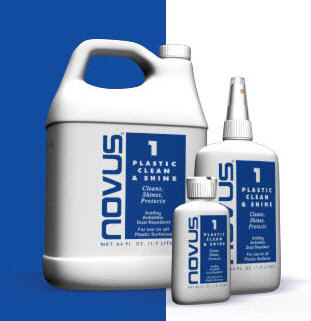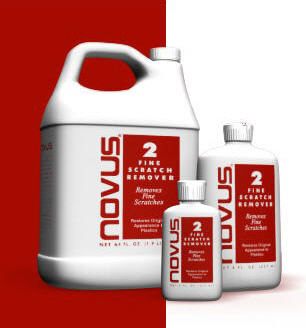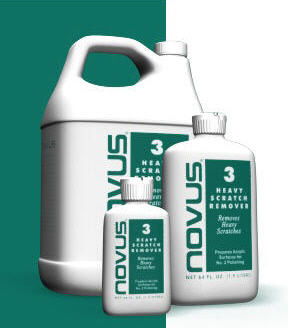 7020 - 8oz Bottle Price: $4.65
|
|
|
 7030 - 8oz Bottle Price: $4.65
|
|
|
 7040 - 8oz Bottle Price: $5.35
|
|
 7020 - 8oz Bottle Price: $4.65
|
|
|
 7030 - 8oz Bottle Price: $4.65
|
|
|
 7040 - 8oz Bottle Price: $5.35
|
|
Power Buffer
|
If the damaged area is fairly large or badly damaged, a power buffer may be
used with NOVUS No. 2 and No. 3. Use a clean cotton bonnet and operate the buffer at a low speed to avoid overheating the plastic, approximately 1,000 RPM. Each polish should be applied with a seperate, clean bonnet.
|
Before Polishing
|
Before attempting to clean or remove scratches, always make sure the plastic is cool to the touch. Use a liberal amount of plastic cleaner to safely remove surface dust and dirt. In addition, test scratch removers in a small or inconspicuous area for compatibility.
|
Coated Plastics
|
Some plastics are coated with a thin film which may be damaged by the abrasives in the polish. NOVUS No. 2 and No. 3 Polishes are not recommended for use on coated plastics or eyeglass lenses.
|
Polishing Cloth
|
The type of polishing cloth you use will make a difference. The ideal cloth is nonabrasive, absorbent and lint free. To eliminate any chance of scratching, use only disposable cloths. Reusable cloths can retain abrasive particles, but you won't know for sure until the damage is done. Use a soft cotton cloth (such as a diaper), avoid using polyester or rayon wipes which can scratch unprotected plastics.
|